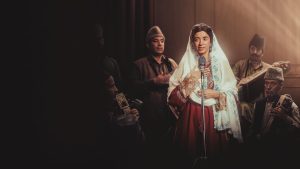
Song of Paradise, the musical drama inspired by the life of Kashmiri legend Raj Begum, has brought renewed attention to the “Nightingale of Kashmir” and her pioneering journey. For fans eager to delve into her world, you can watch Song of Paradise on DeZ TV.
The film, starring Saba Azad and Soni Razdan, paints a poignant picture of a woman who defied societal norms to become the first female singer on Radio Kashmir in the 1950s.
While the film explicitly states it is “inspired by” her songs and legacy, the crucial question remains: how accurately does it reflect the real-life trials and triumphs of Padma Shri Raj Begum?
The answer is a complex blend of tribute and dramatic reimagining, where the essence of her struggle is honored, but certain biographical details are significantly altered.
The Voice That Defied Silence: The Protagonist’s Inspiration
The film centers on the character of Noor Begum (initially Zeba Akhtar), whose powerful voice emerges from a conservative Srinagar where public performance by women was considered taboo. This core narrative perfectly captures the monumental courage of the real Raj Begum.
Born in 1927, Raj Begum began by singing at weddings before joining Radio Kashmir in 1954. This act was, in itself, revolutionary.
The film successfully portrays the immense social pressure and patriarchal resistance she faced. It honors her as a trailblazer who not only found her own voice but also opened the door for future generations of women artists in the region.
The Path to the Radio: Struggles and Support
The film’s plot traces Noor Begum’s initial journey, from working in a music teacher’s home where her talent is first spotted, to her secretly auditioning and winning a competition at Radio Kashmir. The initial societal disapproval, including from her family, is a powerful element in the film.
The struggles for dignity and respect in a male-dominated workspace, even something as simple as demanding a separate restroom for women at the radio station, are highlighted to illustrate her quiet, yet firm, rebellion.
This part of the cinematic story resonates with the historical reality of the conservative environment in which Raj Begum operated.
Her rise on Radio Kashmir made her an instant cultural icon, her songs becoming a powerful soundtrack for the Kashmiri people.
For those who enjoy watching historical dramas, many services let you watch bollywood movies for free, giving you a taste of these rich cinematic narratives.
Love, Marriage, and Artistic Mentorship
One of the most notable deviations from the historical record lies in the portrayal of her personal life and the man who helps shape her career.
In the film, Noor Begum is romantically linked to a progressive poet named Azaad, who passionately encourages her to use her voice for ‘Inqilaab’ (revolution) and becomes her husband. He is depicted as a strong, non-judgmental ally.
The real story, however, involved a very different dynamic. Raj Begum was married to Qadir Ganderbali, a high-ranking police officer who oversaw the cultural department.
Historically, this connection was both a facilitator of her artistic career and a political entanglement, as Ganderbali’s role tied him to the structures of the government at the time.
The choice by the filmmakers to replace the police officer with an idealistic poet dramatically shifts the power dynamic and removes the complexities of her real-life political associations, opting instead for a simpler, more inspiring narrative about a personal love story aiding artistic freedom.
This artistic choice makes the film a compelling addition to the canon of contemporary Bollywood musical movies, prioritizing emotion over strict biographical accuracy.
The Art of Artistic License: What the Film Omits
While celebrating her cultural legacy, Song of Paradise avoids many of the deeper, darker complexities of the socio-political context of the 1950s and 60s Kashmir, which inevitably shaped Raj Begum’s life and art.
Historical accounts suggest her journey was more deeply interwoven with the political landscape of the time than the film suggests.
Furthermore, a detail like Raj Begum being illiterate in real life (signing documents with a thumb impression) is replaced in the film by the character Noor Begum reading contracts, another softening of her true background.
By focusing primarily on an individual feminist triumph over local patriarchy, the movie presents a sanitized version of history, leaving out the more turbulent political elements that many argue were inseparable from her life in the region.
Summary
Ultimately, Song of Paradise serves as a lyrical, heartfelt tribute to the music and spirit of Raj Begum, successfully reintroducing her forgotten legacy to a new generation.
It is a compelling drama about a woman’s fight for her voice, offering inspiration and honoring the cultural icon she became, even as it takes artistic license with the finer details of her extraordinary life.
